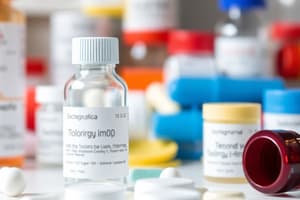Podcast
Questions and Answers
What is the main focus of Toxicology?
What is the main focus of Toxicology?
- Investigating the legality of different substances
- Studying the effects of drugs on the brain
- Enhancing sporting performance
- Detecting and treating toxic substances (correct)
How are drugs defined in the context of the text?
How are drugs defined in the context of the text?
- Chemicals that affect the brain by activating neurons (correct)
- Substances used to enhance sporting performance
- Substances with no physiological effect on the body
- Any liquid consumed by living organisms
Which process involves drug absorption into the body?
Which process involves drug absorption into the body?
- Distribution to various tissues
- Metamorphosis (correct)
- Excretion
- Breakdown of drugs
What does doping refer to in the context of the text?
What does doping refer to in the context of the text?
How do drugs primarily affect the brain according to the text?
How do drugs primarily affect the brain according to the text?
What are the key processes involved in drug kinetics (pharmacokinetics)?
What are the key processes involved in drug kinetics (pharmacokinetics)?
What is considered an Anti-doping Rule Violation?
What is considered an Anti-doping Rule Violation?
Which of the following is NOT an example of an Anabolic Androgenic Agent?
Which of the following is NOT an example of an Anabolic Androgenic Agent?
What is the main aim of the World Anti-Doping Agency (WADA)?
What is the main aim of the World Anti-Doping Agency (WADA)?
Which hormone mimics natural hormones to regulate the body's functions?
Which hormone mimics natural hormones to regulate the body's functions?
What type of substances are EPO and HGH, as mentioned in the text?
What type of substances are EPO and HGH, as mentioned in the text?
'Whereabouts failures' in anti-doping refer to what action?
'Whereabouts failures' in anti-doping refer to what action?
Flashcards are hidden until you start studying
Study Notes
Toxicology
- Scientific study of adverse effects of chemicals on living organisms
- Involves observing and reporting symptoms, mechanisms, detection, and treatments of toxic substances
What is a Drug?
- Substance with physiological effects when ingested or introduced into the body
- Can be legal (alcohol, caffeine, tobacco) or illegal (cannabis, ecstasy, cocaine)
- Interacts with receptors on cell surfaces or enzymes within cells
How Do Drugs Work?
- Affect the brain by tapping into its communication system
- Interfere with neuron communication and processing
- Examples: marijuana and heroin, which mimic natural neurotransmitters
Pharmacokinetics
- Body's actions to deal with a drug: absorption, distribution, metabolism, and excretion
Doping Control
- Administration of drugs to enhance sporting performance
- Considered a doping violation if:
- Presence of prohibited substance or its metabolites in an athlete's sample
- Use or attempted use of a prohibited substance or method
- Evading, refusing, or failing to submit to sample collection
- Whereabouts failures
- Tampering or attempted tampering with the doping control process
- Possession of prohibited substance or method
- Trafficking or attempted trafficking
- Administration or attempted administration to an athlete
- Complicity
- Prohibited Association
World Anti-Doping Agency (WADA)
- Founded to bring consistency to anti-doping policies and regulations
- Works in conjunction with six International Standards
- Focuses on testing, investigations, laboratories, therapeutic use exemptions, protected list of prohibited substances and methods, code compliance, and privacy
Prohibited Substances and Methods
- Anabolic Agents
- Peptide Hormones, Growth Factors, and Related Substances
- Beta-2 Agonists
- Hormone and Metabolic Modulators
- Diuretics and Masking Agents
- Stimulants
- Narcotics
- Cannabinoids
- Glucocorticoids
- Steroids
- Anabolic Androgenic Agents (e.g., Clenbuterol, Testosterone, Stenbolone, Formebolone)
- Examples: EPO (erythropoietin) and HGH (human growth hormone)
Studying That Suits You
Use AI to generate personalized quizzes and flashcards to suit your learning preferences.




